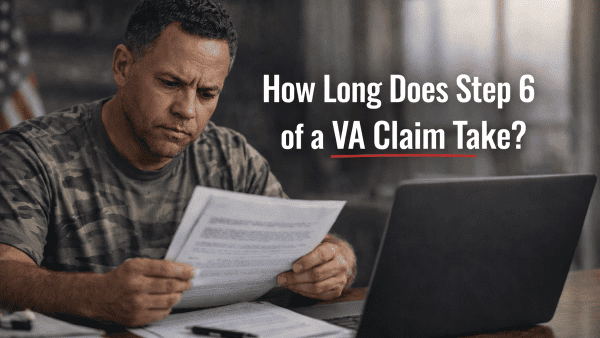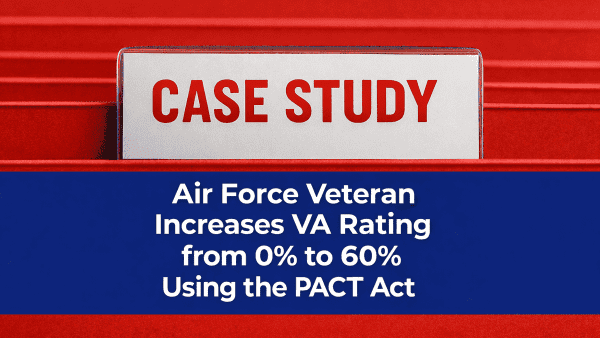Looking for Expert-Level VA Claim Answers?📱Call Us Now! 737-295-2226
Yes, you can collect VA disability and Social Security retirement benefits at the same time, without one reducing the other.
This is great news for veterans approaching retirement who may worry about losing out. VA disability and Social Security retirement are separate programs run by different agencies, and they don’t interfere with each other.
In this post, you’ll learn how these systems work together, key differences between them, and practical ways to plan for maximum financial stability in retirement.
Table of Contents
Summary of Key Points
- VA disability benefits remain completely tax-free, unlike Social Security retirement, which may be partially taxable
- Strategic timing of your Social Security claims can increase your lifetime benefits
- Regular reassessment of your VA disability rating ensures fair compensation as conditions change
- Both VA healthcare and Medicare together provide more comprehensive coverage options
What Happens When You Receive Both VA Disability and Social Security Retirement?

Many veterans wonder about the interaction between their military service benefits and Social Security. The good news is straightforward: You absolutely can receive both VA disability and Social Security retirement benefits simultaneously without reduction to either benefit.
Can you collect both at the same time?
Yes. Collecting both VA disability and Social Security retirement is not only possible but encouraged for eligible veterans. These programs serve different purposes:
- VA disability compensates for service-related injuries and conditions
- Social Security retirement is based on your work history and payment of Social Security taxes
Pro Tip: There’s no requirement to choose between these benefits. Each application process remains independent, and approval for one doesn’t influence eligibility for the other.
How the two systems operate independently
The independence between these systems is a crucial advantage for veterans:
- Different funding sources: each program has its own budget allocation
- Separate eligibility criteria: VA looks at service connection, while Social Security examines work history
- No offset between benefits: unlike some government programs, there’s no “double-dipping” penalty
Note: While VA disability doesn’t affect Social Security retirement or SSDI, it does impact Supplemental Security Income (SSI). Since SSI is needs-based, VA benefits count as “unearned income” and will reduce SSI payments after a $20 exclusion.
Real-life example of combined benefits
Consider this practical example of how benefits combine:
A veteran receives $400 monthly for VA disability compensation. Additionally, because they worked and paid into Social Security and meet SSA’s disability criteria, they receive $850 in Social Security Disability Insurance. Their combined monthly income becomes $1,250.
For retirement benefits, the calculation works similarly. If a veteran receives $400 in VA benefits and qualifies for $900 in Social Security retirement, their total monthly income becomes $1,300.
This combination of benefits can substantially improve a veteran’s financial stability during retirement years. Unlike some other government benefits, there’s no requirement to report VA disability payments to the Social Security Administration when receiving retirement benefits.
Key Differences Between VA Disability, SSDI, and Social Security Retirement Benefits
Understanding the fundamental differences between benefit programs is essential for veterans planning their financial future. These systems were designed for distinct purposes, yet they can work together effectively.
VA Disability vs. SSDI vs. SSI vs. Social Security Retirement
The four major benefit programs operate under separate rules and eligibility requirements:
- VA Disability: Exclusively for veterans with service-connected conditions, regardless of work ability, paid on a graduated scale (10-100%)
- SSDI: Available to anyone with sufficient work history who becomes unable to perform substantial gainful activity
- SSI: A needs-based program for people with limited income and resources who are disabled, blind, or 65+
- Social Security Retirement: Based on your lifetime earnings and retirement age, available to anyone who has paid into the system for at least 10 years
How each benefit is calculated
Each program uses distinctly different formulas to determine payment amounts:
- VA Disability: Payments based on disability rating percentage (10-100% in 10% increments) and number of dependents
- SSDI: Calculated using average indexed monthly earnings from your 35 highest-earning years
- SSI: In 2025, the monthly maximum is $967 for individuals and $1,450 for eligible couples
- Social Security Retirement: Based on primary insurance amount (PIA) calculated from lifetime earnings, with adjustments for early or delayed retirement
Which benefits are taxable?
Tax treatment varies significantly across these benefits:
- VA Disability: Completely tax-free at the federal and state levels
- SSDI: May be taxable if your combined income exceeds certain thresholds – $25,000 for single filers or $32,000 for joint filers
- SSI: Not taxable
- Social Security Retirement: Up to 85% may be taxable depending on your total income
Note: VA disability benefits remain tax-free regardless of your other income sources, providing a significant advantage compared to other benefits. The absence of tax liability on VA disability compensation preserves more of your hard-earned benefits.
How to Apply and Qualify for Both Benefits
Applying for both VA disability and Social Security retirement benefits requires navigating two separate systems. Fortunately, these processes can be completed simultaneously without one affecting the other.
Step-by-step application process
For VA disability benefits
- Initially, choose your preferred application method: online through VA.gov, by mail with Form 21-526EZ, in person at a VA regional office, or by fax
- Submit your intent to file form first if using paper forms to preserve your potential start date
- The VA will review your claim and gather necessary evidence
- Following review, you’ll receive a decision letter with your disability rating and payment details
For Social Security retirement
- Apply online at ssa.gov, by phone (1-800-772-1213), or visit your local Social Security office
- The SSA will process your application independently from your VA claim
- You must apply for each benefit separately, as approval for one does not guarantee approval for the other
Documents you need to prepare
For VA disability
- DD214 or other separation documents
- Service treatment records
- Medical evidence related to your condition
- Lay evidence (buddy statements) if applicable
For Social Security retirement
- Your Social Security card or number
- Original birth certificate or proof of age
- Proof of U.S. citizenship (if not born in the U.S.)
- Military service papers, if you served before 1968
- W-2 forms or self-employment tax returns
Expedited processing for 100% P&T veterans
Did You Know? Veterans with a 100% Permanent and Total (P&T) disability rating qualify for expedited processing of Social Security Disability (SSDI) claims. To receive this benefit:
- Identify yourself as “Veteran rated 100% P&T” when applying
- Online applicants should enter this in the “Remarks” section
- Submit your VA notification letter verifying your rating
- The SSA will then rush your application through the process
Common mistakes to avoid
- Waiting too long to file your VA claim can reduce potential back payments
- Submitting incomplete documentation or inconsistent statements
- Failing to obtain medical opinions linking your disability to service
- Not filing for secondary conditions connected to your primary disability
- Missing deadlines for submitting forms or attending medical exams
- Giving up after an initial denial instead of pursuing an appeal
Strategies to Maximize Your Benefits
Strategic planning can make a substantial difference in your retirement income when you’re eligible for both VA disability and Social Security benefits. Proper timing and coordination between these programs ensures you receive maximum support throughout your retirement years.
When to start Social Security retirement
For optimal financial security, consider these Social Security timing strategies:
- Delay claiming beyond your full retirement age, if possible, as your monthly benefits increase by approximately 8% each year until age 70
- This delay strategy is especially beneficial if you have a longer life expectancy or continue earning significant income in your later years
- Your VA disability benefits provide stable income while you delay Social Security, potentially increasing your lifetime benefit amount
How to Increase your VA rating
As time passes, many service-connected conditions worsen. To ensure proper compensation:
- Request a re-evaluation if your condition has worsened
- Provide thorough medical evidence documenting the worsening of your condition (medical records, DBQs)
- Be aware that requesting a VA rating increase opens your entire claim for review—the VA can potentially lower your rating if improvement is found
Note: After 20 years with the same rating, the VA generally won’t reduce your percentage below the lowest rate received during that period
Related: Raising VA Disability Ratings: 6 BEST Ways to Get an Increase!
Using Medicare and VA healthcare together
With healthcare costs rising, maximizing both systems provides the most comprehensive coverage:
- Enroll in Medicare when eligible—even with VA healthcare—to expand your provider options
- Medicare doesn’t pay for care at VA facilities, and VA benefits generally don’t cover non-VA providers
- Having both systems gives you flexibility in where you receive care
- Be aware that delaying Medicare Part B enrollment could result in permanent penalties if you later lose VA coverage
Working with a financial advisor or VSO
Given the complexity of coordinating multiple benefit systems:
- Veterans Service Organization (VSO) representatives provide free assistance with VA claims
- Financial advisors can help determine optimal Social Security filing strategies
- VSOs can help gather evidence, file claims, and communicate with the VA on your behalf
- To find accredited help, use the VA’s online search tool for representatives in your area
Conclusion
Receiving both VA disability and Social Security retirement benefits is not only possible—it’s a smart way to maximize the support you’ve earned through your service and your career.
Because these two systems operate independently, there’s no penalty or reduction when you collect both. Planning ahead, filing on time, and knowing how each benefit works will help you make the most of what you’re owed.
Whether you choose to delay Social Security to increase your payout or re-evaluate your VA rating as your condition worsens, you have options. If you need help along the way, Veterans Service Organizations (VSOs) and financial advisors can show you through the process.
Quick Recap
- You can receive both VA disability and Social Security retirement benefits in full—there’s no penalty or reduction.
- VA disability is tax-free and doesn’t count as income for Social Security retirement or SSDI (but it does affect needs-based SSI).
- Each program is separate, with its own eligibility rules and application process—approval for one doesn’t impact the other.
- Strategic planning matters: Consider delaying Social Security for a higher payout, reassessing your VA rating, and using both Medicare and VA healthcare.
Want Expert-Level Support for Your VA Disability Claim? WE GOT YOUR SIX!
How does VA Claims Insider support veterans?
We make the confusing and frustrating VA claim process EASY through our 8-step proprietary system and one-on-one coaching; we’re the VA Claim EXPERTS you can trust, and YOU are never alone in this fight against the VA!
You’ll also receive VA disability expert Brian Reese’s SEM Method Blueprint—a proven formula that has helped over 25,000 veterans win their VA disability claims faster:
Strategy + Education + Medical Evidence = VA Rating and Compensation You Deserve FASTER!
Start today and unlock an exceptional level of service you deserve for serving our country:
- You’ll hear from a VA Claim Expert over email within 15 minutes of signing up today.
- You’ll hear from your Veteran Coach team within 24 hours of all inquiries during normal business days/hours.
- Our terms are clear and simple: If we don’t win, you don’t pay. You have nothing to lose and everything to gain.
Click the red button below to start the process of winning your VA claim right now!
FAQs | Frequently Asked Questions
Can I receive both VA disability and Social Security retirement benefits simultaneously?
Yes, you can receive both VA disability and Social Security retirement benefits at the same time. These are separate programs with different eligibility criteria, and receiving one does not affect or reduce the other.
How does VA disability compensation impact Social Security retirement benefits?
VA disability compensation has no impact on Social Security retirement benefits. The two systems operate independently, and VA disability is not counted as income for Social Security retirement purposes.
What happens to my SSDI benefits when I reach retirement age?
When you reach full retirement age (typically 65-67), your Social Security Disability Insurance (SSDI) benefits automatically convert to Social Security retirement benefits. The amount remains the same, but the classification changes.
Do I need to report my VA disability benefits to the Social Security Administration?
For Social Security retirement or SSDI, you do not need to report VA disability benefits, as they don’t affect these programs. However, if you receive Supplemental Security Income (SSI), you must report VA benefits as they count as “unearned income” and may affect your SSI payments.
Will my VA disability benefits continue after I turn 65?
Yes. There is no age limit for receiving VA disability compensation, and it will continue as long as your service-connected condition persists.
About VA Claims Insider

- VA Claims Insider is the #1 most trusted name in VA disability claims.
- Work directly with a VA claims coach who can educate you to VA claim victory.
- 25,000+ disabled veterans have served in our membership programs since 2016.
- 30% average rating increase for veterans who complete our #1-rated Elite program.
- 4.7/5.0 average rating out of 5,500+ total reviews; over 4,500 5-star reviews.
Author

Eric Webb
Eric has written and worked in the field of Veterans Disability since 2020 and enjoys writing educational content for the veteran population. His prior work has been published in the Official Journal of the American College of Sports Medicine (ACSM). He holds a Degree in Health and Exercise Science.



